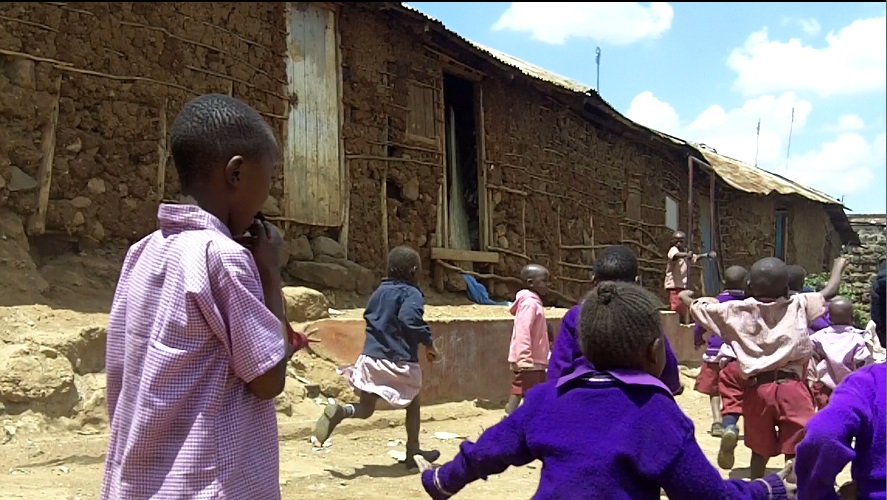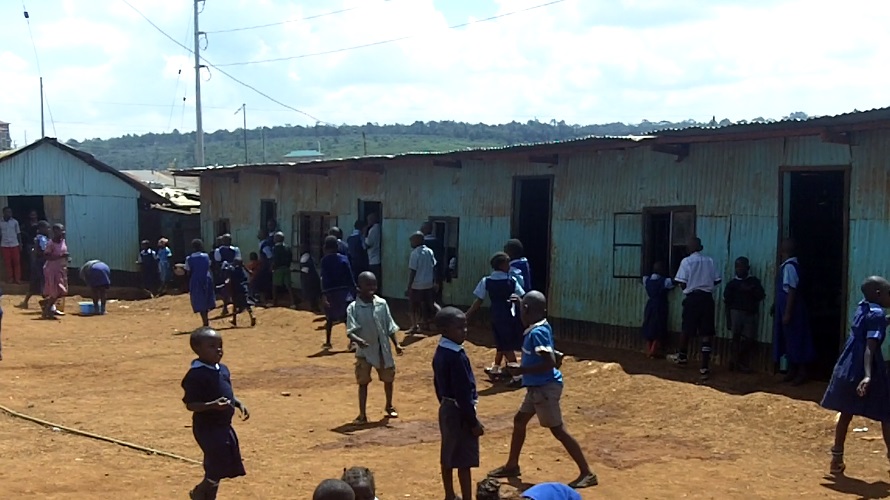By: Stephene Oduor and Joshua Owino
Map Kibera is now partnering with GroundTruth Initiative, Development Gateway, Feedback Labs, and the Gates Foundation to gather and share information about schools in Kibera.  We will include citizen data and maps, authoritative data, and citizen feedback on education and schools, including the informal sector, making school data transparent and useful to everyone from citizens to NGOs to government.Â
This is the first of a series of blog posts by our Map Kibera resident team that will detail our progress. Map Kibera members have recently been talking to many people – from parents of school children, to school directors – to gather their thoughts about education in Kibera.
Education is the key to success in life, so they say. But the information on where the genuine key is offered has proved to be challenge to many parents in Kibera, and some just prefer getting the counterfeit keys than no keys at all, call it informal education.
“We give formal education in an informal setting. If you are going to give informal education to these children, and you expect them to compete with others, I think it’s going to be a very big challenge,†observes Fred Ogutu, School Director at Hope Academy.
The problems that hinder children from Kibera slums from acquiring quality education vary from village to village and school to school, though most of these problems are common in almost all the villages and schools that make up the Kibera slums.
Access to information, or lack of it, is far most the number one challenge that affect both the parents and schools. Most parents, due to various reasons that include poverty, are unable to know which school offers the right key to success and they mostly go for the cheapest school available or as advised by another parent who probably has a child in the same school, or both.
“We live here, we know the challenges that they have, one of them is paying school fees,†says one George Oketch, a teacher at Strays School in Kibera.
Another problem that affects the children, especially those in upper primary and high schools, is engaging in drugs and criminal activities that make them not be able to be in class when required.
A high percentage of private schools, lack enough books and classrooms to accommodate the large number of children who join the schools from the public schools. Whereas in public schools, the missing tool is quality education. Many parents interviewed believe that the teachers in public schools are no longer committed to their work since the introduction of free primary education. This has led to quality of education moving down the scale, hence success becoming more of a dream than a reality in these public schools. But another challenge is that, most of the private schools have not advanced beyond classes four and five, which forces parents to turn to public schools for upper primary education.
Which reminds me, school directors at both Wisdom Ashrays academy and Great Achievers school calls their schools complimentary schools. As a matter of fact, Wisdom Ashrays Director went further to say that there is no private school in Kibera and all schools that are not Public are complimentary schools, which left us a little bit confused. The clarification given to us concerning this was that, complimentary schools are not recognized by the government and the schools are still pushing for them to be recognized. “But I thought all schools that are not public are private schools, because they are owned privately,†I asked myself that. Well, I learnt about complimentary schools for the first time.
Fred Ogutu, school director at Hope Academy believes that education is part of upgrading the children’s minds to bring positive change in the community.
“You don’t need to physically upgrade Kibera, you can upgrade the children in their minds and then the physical structures will go down,†he says. “In the slum upgrading houses, if you were to walk there now, you will discover that, that place is a slum, the drainage is not working because you don’t upgrade people by doing structures.â€
He also observed that the land in which most of these schools sit is government land, which makes it difficult for donors to help build permanent classrooms because most of the school owners are not sure how long they will be on the land before evictions take place.
“If you have a very temporary thinking about your land tenure system, you cannot invest,†says Fred Ogutu.
Poverty and joblessness has been identified as the biggest problem facing parents in having their children get quality education, as identified by both the parents themselves and teachers. This leads to the children being absent from class most of the time because they either lack school fees or are involved in other income generating activities that prevent them from attending school. This sometimes doubles up with other domestic issues where the parents quarrel hence creating a No-learning atmosphere.
Teachers also pointed out that the Kibera environment does not favour the schools, especially those deep in the slum, because when it rains, it gets so muddy and most children cannot make it to school. Many schools also overflow with a very large number of children in class, this applied to both the private and public schools.
Almost all schools that the survey was carried through offer lunch for the children, at a fee of course, except for the few that have feeding program support such as Mashimoni Squatters School whose feeding program is sponsored by the World Food Program.
Most parents, before taking their children to school, consider Distance, that is how close the schools is from where they live; cost in terms of schools fees; and if the schools offer some food because most of these parents go for work during the day, so they prefer that their children feed at school.
Children are the only raw materials from which you can manufacture responsible human beings, and the concerned parties need to do their best to ensure all children in the slums get good quality education that can help them in the future and shape them to be responsible successful adults.
But until the right and genuine key is given, that is education, success will continue to be a door that is only talked about but never opened.

